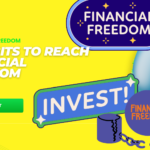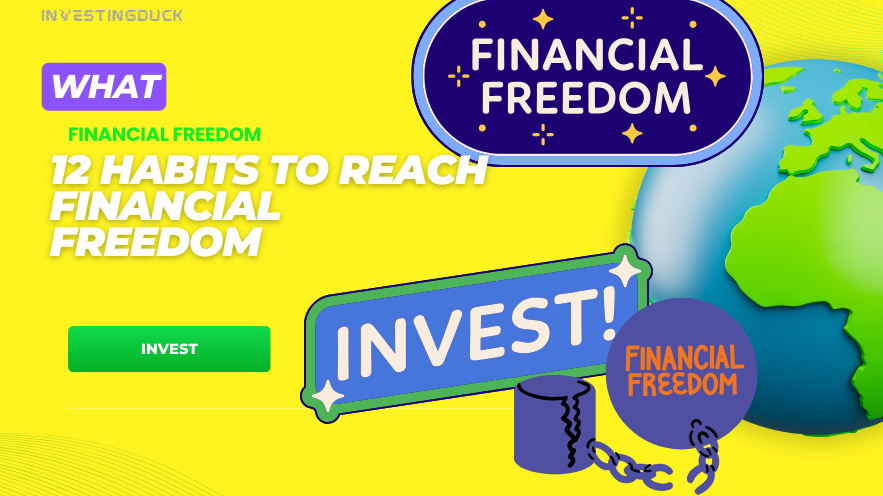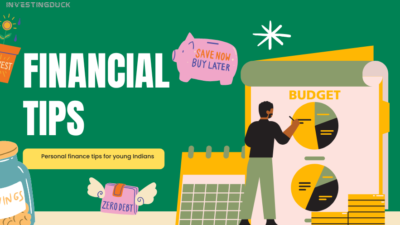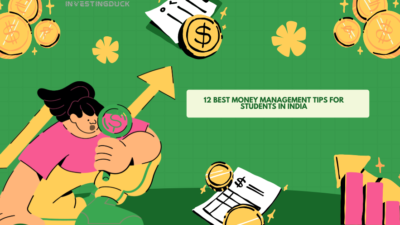Achieving financial freedom isn’t an overnight accomplishment—it’s a process that requires dedication, discipline, and the right habits. While many dream of financial independence, few know the exact steps to take. In this article, we will explore 12 crucial habits that can help you build wealth, eliminate debt, and eventually reach financial freedom. Whether you’re just starting your financial journey or looking to refine your habits, these strategies will guide you towards a more secure and prosperous future.
At InvestingDuck.com, we are committed to providing financial education and actionable insights that help you grow your wealth. Let’s dive into the 12 habits you need to adopt to achieve financial freedom.
1. Create a Clear Financial Plan
The first step towards financial freedom is to have a well-defined financial plan. Without a roadmap, it’s easy to get off track or miss important milestones. A clear financial plan should include:
- Budgeting: Track your income and expenses. Know where your money is going each month and ensure you allocate funds for savings, debt repayment, and investments.
- Savings Goals: Set short-term and long-term savings goals. Whether it’s an emergency fund or saving for a home, having specific targets will keep you focused.
- Retirement Planning: Start contributing to retirement accounts early, such as a 401(k) or IRA, to ensure you have enough funds to retire comfortably.
2. Budget and Track Your Spending
You don’t need to follow a strict budget to gain financial control, but tracking your spending is essential for identifying areas where you can cut costs. This is a fundamental habit that separates those who reach financial freedom from those who struggle financially.
- Use Budgeting Tools: Apps like Mint, YNAB (You Need a Budget), or a simple spreadsheet can help you keep track of your income and spending habits.
- Cut Unnecessary Expenses: Review your discretionary spending (like dining out, subscriptions, and entertainment) and see where you can make cuts.
- Prioritize Savings: Pay yourself first. Automate transfers to your savings account or investment funds to ensure you’re always putting money aside.
3. Build an Emergency Fund
An emergency fund is your safety net during life’s unexpected events. Whether it’s a medical emergency, job loss, or an unexpected car repair, having cash readily available can prevent you from going into debt.
- Aim for 3-6 Months of Expenses: Ideally, your emergency fund should cover three to six months of living expenses.
- High-Yield Savings Account: Keep your emergency fund in a high-yield savings account where it can earn interest while still being easily accessible.
4. Pay Off Debt Strategically
Debt can be a significant barrier to achieving financial freedom. High-interest debt, like credit card balances, can quickly become overwhelming. Adopt a strategy to reduce and eliminate your debts over time.
- Debt Snowball Method: Pay off your smallest debts first to gain momentum and motivation.
- Debt Avalanche Method: Focus on paying off high-interest debts first to save on interest costs in the long term.
- Consolidate Debt: If you have multiple debts, consider consolidating them into a single loan with a lower interest rate to simplify payments.
5. Automate Your Finances
Automation is a powerful tool that ensures you’re consistently saving and investing, even if you’re too busy or distracted to do so manually. By automating your finances, you can eliminate the risk of missing payments or forgetting to save.
- Automatic Bill Payments: Set up automatic payments for your bills to avoid late fees and improve your credit score.
- Automate Savings: Set up automatic transfers from your checking account to your savings or investment accounts.
- Retirement Contributions: If possible, have a percentage of your income automatically deducted and placed into a retirement account.
6. Invest Early and Often
One of the most important habits for reaching financial freedom is investing. The sooner you start investing, the more time your money has to grow.
- Start Small: Even if you can only invest a small amount initially, starting early gives you the benefit of compounding returns.
- Diversify Your Investments: Spread your investments across different asset classes—stocks, bonds, real estate, and mutual funds—to reduce risk.
- Retirement Accounts: Contribute regularly to retirement accounts like a 401(k), Roth IRA, or traditional IRA. Take full advantage of any employer match if available.
7. Focus on Increasing Your Income
While managing expenses is crucial, increasing your income is just as important when it comes to financial freedom. There are several ways to increase your income:
- Side Hustles: Explore side gigs or freelance work to supplement your primary income.
- Invest in Yourself: Improve your skills, get certifications, or advance your education to increase your earning potential.
- Seek Promotions or New Opportunities: Don’t be afraid to negotiate for higher pay at your current job or explore new career opportunities that offer better compensation.
8. Protect Your Wealth with Insurance
Insurance may not seem like a direct path to financial freedom, but it is an essential part of protecting your assets and future. Proper insurance ensures that you’re not financially devastated by unexpected events.
- Health Insurance: Medical bills are one of the leading causes of financial hardship. Ensure you have sufficient health coverage to avoid crippling medical expenses.
- Life Insurance: If you have dependents, life insurance is crucial to protect them financially if something were to happen to you.
- Disability Insurance: Disability insurance ensures that you can continue to receive an income if you’re unable to work due to illness or injury.
9. Set Long-Term Goals and Stay Committed
It’s easy to get sidetracked by short-term desires, but financial freedom is a long-term goal that requires dedication. Stay focused on your long-term objectives, whether they are buying a home, traveling the world, or retiring early.
- Visualize Your Goals: Write down your goals and visualize them regularly to stay motivated.
- Review and Adjust: Revisit your goals periodically and make adjustments based on your evolving priorities and circumstances.
10. Live Below Your Means
Living below your means is one of the most powerful habits for achieving financial freedom. Just because you earn more doesn’t mean you should spend more. By avoiding lifestyle inflation, you can save and invest more for your future.
- Practice Frugality: Focus on getting the most value for your money. Buy quality items that last longer instead of cheap, disposable products.
- Prioritize Needs Over Wants: Make conscious decisions about your purchases, opting for what you truly need over fleeting desires.
11. Educate Yourself About Finance
Financial education is an ongoing process. The more you learn, the better decisions you can make. Make it a habit to continually educate yourself about personal finance, investing, and money management.
- Read Books and Articles: Books like Rich Dad Poor Dad by Robert Kiyosaki or The Millionaire Next Door by Thomas Stanley can offer valuable insights into wealth-building habits.
- Follow Financial Blogs: Stay updated with personal finance blogs like InvestingDuck.com to learn new strategies and tips.
- Take Online Courses: There are many free and paid courses available that can help you gain a deeper understanding of financial concepts.
12. Stay Patient and Be Consistent
Finally, achieving financial freedom takes time. Stay patient and remain consistent with your habits. Financial freedom doesn’t happen overnight, but the compound effect of disciplined habits will pay off in the long run.
- Don’t Get Discouraged: There will be setbacks along the way, but remember that every step forward is a step closer to your goal.
- Track Your Progress: Keep track of your net worth, savings, and investment growth to stay motivated.
Conclusion: Building Financial Freedom is a Lifelong Journey
Achieving financial freedom is possible, but it requires the right mindset and consistent effort. By implementing these 12 habits—creating a financial plan, budgeting wisely, paying off debt, investing early, protecting your assets, and educating yourself—you can set yourself on the path to a more secure and prosperous future.
At InvestingDuck.com, we’re here to help you along the way with actionable advice, tips, and financial resources. Start today and take control of your financial future, one habit at a time.
1. What does financial freedom mean?

Financial freedom means having enough income and assets to cover your expenses without needing to work actively for a paycheck. It’s about having control over your money and the ability to live life on your own terms, without worrying about day-to-day financial stress. Achieving this state allows you to focus on your passions, dreams, and goals rather than constantly worrying about making ends meet.
2. Can anyone achieve financial freedom, or is it only for the wealthy?
Anyone can achieve financial freedom, no matter their current financial situation. The key is adopting the right habits, staying disciplined, and making informed decisions. It doesn’t require being born wealthy; it’s about managing your money well, saving regularly, and investing strategically. Starting early, even with small steps, can lead to financial independence over time.
3. Why is budgeting one of the key habits for financial freedom?
Budgeting is the foundation of financial success because it helps you understand where your money is going. By tracking your income and expenses, you can make adjustments, cut unnecessary spending, and allocate more funds to savings or investments. Without a budget, it’s easy to lose track of your financial goals. Budgeting ensures you’re always working toward your larger goals—whether that’s paying off debt, saving for retirement, or investing for future growth.
4. How much should I save each month to reach financial freedom?
The amount you should save depends on your income and financial goals, but a good rule of thumb is to aim for saving at least 20% of your monthly income. Start by building an emergency fund (3-6 months of expenses), then focus on long-term savings and investments. The more you can save, the faster you’ll reach financial freedom. Consistency is key, and even if you can only save a small amount, the habit of saving regularly will pay off over time.
5. How can I reduce my debt to achieve financial freedom?
Debt, especially high-interest debt like credit cards, can be a major obstacle on your path to financial freedom. To reduce debt, consider using the debt snowball method (paying off the smallest debt first) or the debt avalanche method (paying off high-interest debt first). Either method will help you gain momentum and eventually eliminate your debt. Focus on cutting unnecessary expenses and directing those savings toward debt repayment.



